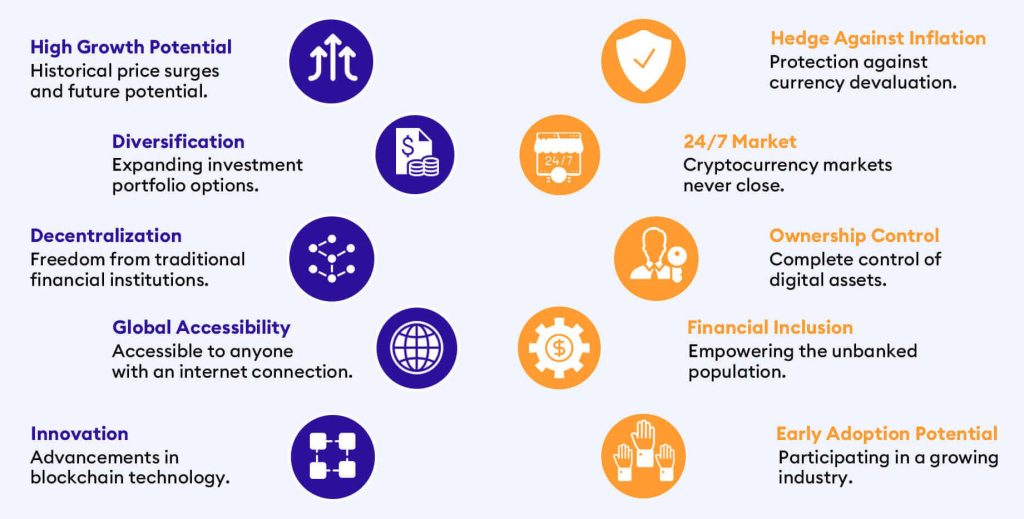Table of Content
Cryptocurrencies have taken the world by storm. Currently, more than 20,000 cyber currencies are available for acquisition. Many of these cryptocurrencies are issued by private organizations to facilitate specific types of transactions. In this article, you’ll learn about cryptocurrency, why people invest in it, and how you can keep your money safe if you choose to do so. So read on to understand this new financial phenomenon before it takes over your bank account.
What is cryptocurrency?
A cryptocurrency is a form of digital money created and secured by computer networks (Cryptocurrencies use cryptography for security). People who use this digital money transact directly with each other without a third party, such as a bank. The first cryptocurrency (digital money) was Bitcoin, invented in 2009. The decentralized nature of cryptocurrencies means they are not controlled by any central authority, such as a central bank or government. Instead, they are managed through various blockchain protocols.
Cryptocurrency is a type of digital currency that is created and managed electronically. It uses cryptography to secure and verify transactions and control the creation of new units. There are many reasons why people invest in cryptocurrencies, such as the potential for high returns, the opportunity for high volatility, or to diversify their assets.
However, cryptocurrencies are not regulated by any central bank or government, so they can’t be traced or identified. Cryptocurrency registers all transactions in the blockchain ledger; all the transactions can be traced easily, but identifying the identity of the sender and receiver may be challenging. In most situations, senders’ and receivers’ wallets are not tagged with a descriptive name to identify the identity of the wallet owners.
Cryptocurrency has been gaining popularity in recent years. This is because it is a new type of currency that can be used as an alternative to traditional currencies like USD, EUR, GBP, and others. The most popular types of cryptocurrencies are Bitcoin, Ethereum, etc…
Why invest in cryptocurrency?
- Investment opportunity: The cryptocurrency market is still young but expected to grow exponentially over the next decade. Investors are interested in this market because it has the potential to generate high returns along with increased risk. As of July 2022, Bitcoin.com reported approximately 83 million blockchain wallet users worldwide. The majority of whom are millennials. As a result, investors may earn higher returns if they understand the risks involved.
- Security: Cryptocurrency uses digital wallets to store and transact. Crypto wallets can be your own wallets or third-party wallets. You depend on their security and trust if you store cryptocurrency in a third-party wallet.
- There are two options:
- Software wallet (Hot Wallet) – As the name suggests, software wallets use software such as apps or browser extensions to store cryptocurrencies. They are always connected to the internet, hence also known as “hot” wallets.
- Hardware wallet (Cold Wallet) – Hardware wallets are physical devices used to store cryptocurrency offline. These types of wallets are not as convenient as software wallets when transacting, but they offer far greater security and are considered the norm when it comes to storing cryptocurrencies.
- Third-Party Wallets There are many third-party wallet types following are a few options. In these cases, you are dependent on third-party security and trust.
- Exchange Wallets – If you are a day/swing trader or any regular trader, you need to have the assets in an exchange.
- Custodial Wallets – They are used mainly by institutions and large investors. Rather than managing their wallets, they are using third-party custodial services. In most cases, third-party custodial services keep a large percentage of assets in cold wallets, and only a tiny portion is kept in hot wallets for liquidity. Most of the custodial services are backed by insurance.
- Defi Wallets – This is an option to increase your returns. There are many Defi projects project provide higher interest. But this option comes with a higher risk. We have seen many liquidity pools, and even though some of the pools had the right intentions, the economic strategy failed significantly.
- There are two options:
- Privacy: Cryptocurrencies are transacted between wallets; to create a wallet, you don’t need to disclose your personal data to a third party. Transactions in a blockchain execute based on your wallet ID, not based on your sensitive personal details such as name, passport, or driving license, as the recipient or sender doesn’t need to know your personal data.

Benefits of Investing
- The cryptocurrency ecosystem is rapidly proliferating, and new coins and tokens are entering the market daily. The cryptocurrency industry has grown from an underground movement into a global phenomenon, with more than 20,000 cryptocurrencies available today. Bitcoin was created in 2009, and since then, many other cryptocurrencies have been created, such as Ethereum, Ripple, Litecoin, Monero, and many others. Cryptocurrency has the potential to change the way we do business. It is not just a new form of currency but also a way to decentralize and democratize the ownership of wealth. Investing in cryptocurrencies can expose you to high-growth industries like healthcare, transportation, cybersecurity, law, and banking.
- Invest in innovative start-ups: Cryptocurrency markets are growing; new start-up companies are entering the market every day. Some of these companies have been successful in their endeavors and have seen a considerable increase in their market cap, while others have yet to be as fortunate. Successful start-ups like Ripple and Ethereum have seen an increase in the value of their tokens, which has caused many investors to buy into these cryptocurrencies. In 2017 alone, Ethereum was up over 2,000%.
- Medium of storing wealth: Cryptocurrencies are an ideal medium for storing wealth. It is a digital currency created and stored electronically in the blockchain. You can use it to buy goods and services just like any other currency, but unlike most other currencies, cryptocurrencies are not controlled by any central bank or government. This means that you don’t have to worry about inflation or banks that might go bankrupt. A cryptocurrency such as bitcoin has a fixed supply and has been gaining popularity as a more convenient alternative to gold.
Risk of Investing
- High volatility: The price of cryptocurrency is very volatile. It can go up or down rapidly in a day. This means that there is a high risk associated with investing in it. A cryptocurrency’s value can be influenced by many factors, including but not limited to the following:
- The introduction of competing cryptocurrencies and the consequent effects on demand for the original cryptocurrency.
- The utility of the original cryptocurrency as a form of payment or store of value.
- Regulatory actions by government agencies, such as clarifying regulations or banning cryptocurrencies entirely.
- The availability and popularity of other forms or methods for using payments, like credit cards, debit cards, bank transfers, PayPal transactions, or other systems that might be more convenient than using cryptocurrencies.
- General economic conditions such as inflation rates, interest rates, currency exchange rates, and market sentiment.
- Geopolitical events and technological developments.
- Lack of protection for consumer financial products: Cryptocurrency markets are relatively young and are prone to fraud. You can’t count on your bank or insurance provider to protect you from these risks. However, you can protect yourself by investing only what you can afford to lose and keeping your cryptocurrency in a secure digital wallet.
- A lack of regulation: Cryptocurrency markets are unregulated. As such, they are susceptible to fraud and manipulation. As a result, some governments and regulatory agencies have expressed concerns about these markets. If a significant cryptocurrency exchange goes under or is hacked, it could cause considerable market turmoil.
Conclusion
Like any other financial product, investing in cryptocurrencies comes with many risks. You could lose all your money if the coin you purchase crashes or hackers steal your funds from an exchange. At the same time, investment in cryptocurrencies also has potential. It is a perfect way to get exposure to high-growth industries and start-ups while saving on transaction fees. Due to the deflationary nature of many cryptocurrencies such as Ethereum, they have the potential to be excellent hedges against inflation. Finally, before making any cryptocurrency investments, you should always do your own research and accept the risks involved with it.


